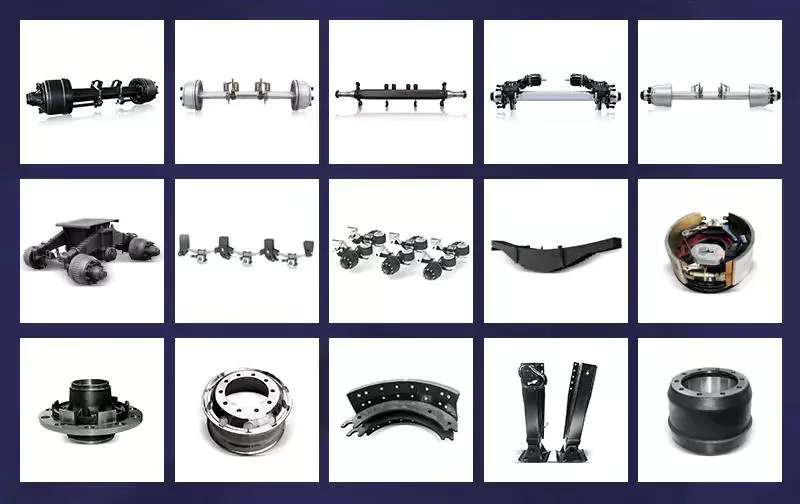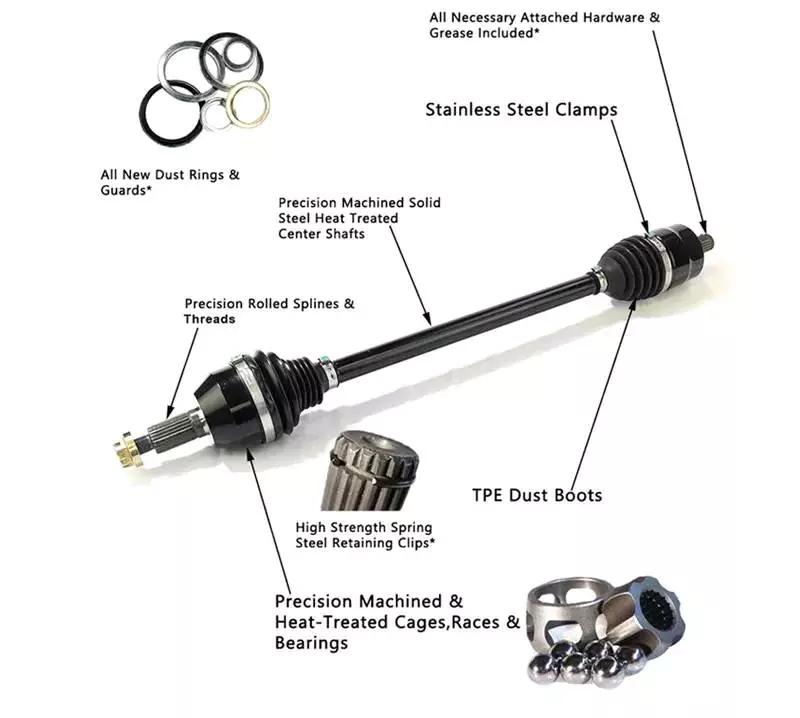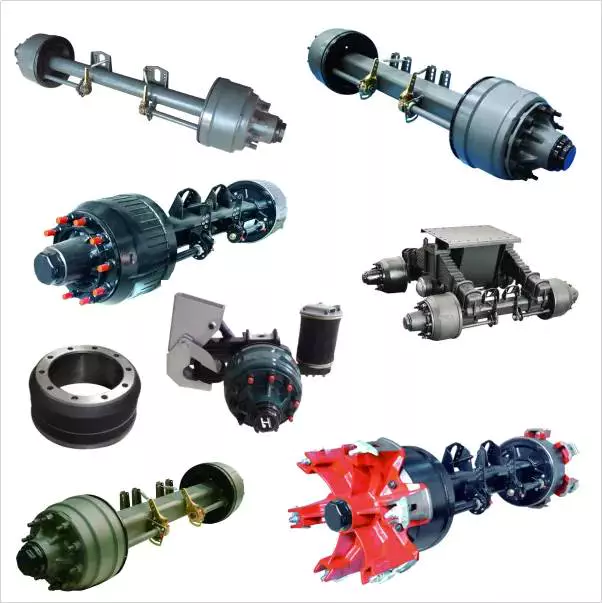Item Description
Fusai in Bulk 1840mm Track Rear Trailer Axle with ISO/Ts16949
Organization introduction:
ZheJiang CZPT Co.,Ltd is 1 of the major producers specializing in the production of trailer axles.
Our organization has substantial technological track record, innovative producing technological innovation, advances detection means, ideal quality assurance technique. It is a specialized company integrating scientific study, design and style, production and income.
The generation of “FUSAI” trailer axles handed the national authoritative department detection. The tiredness daily life is up to 1,500,000 times without having injury-more than 3 occasions previously mentioned the national common, which is in the leading domestic level, and reach or exceed the global expectations. Our goods are well-liked not only in domestic markets, but all over the entire world. Since the merchandise are designed and optimized by pc, they have affordable framework, excellent braking performance, substantial toughness and rigidity, sturdy bearing ability, long provider daily life, excellent support, trustworthy by the end users.
“FUSAI” brand name German fashion trailer axle
1.German spindle design and style which is the widely used in the business with confirmed performance
two.Minimal-alloy machined spindles, friction welded seamlessly, and all round heat managing method
three.Axle stubs and brake hubs are all CZPT forging, guarantee they are a lot more potent and far better constant
four.Special clone-form style on the axle-shoulders, lessening stress concentration and boosting anti-tiredness overall performance
five.Exclusive layout on axle stubs (with a precise declination angel at equally finishes) to lessen tire put on
six.Countrywide and market normal compliant set elements
seven.National Car Check and Inspection Centre licensed axle shaft that undergoes over 1.2 million moments of Tiredness screening and built to fulfill or exceed national business expectations.
German type axle requirements:
Product: FSL-14A
Bearings: 33215/33119
Potential: 14T
Brake: 420*200mm
Observe:1840mm
Middle length of brake chamber: 357mm
Axle beam: 150*150*14mm
Stud: 6*M20*2ISO
Total length: 2223mm
Weight: 445kg
Product: FSL-16A1
Bearings: 32314/32222
Ability: 16T
Brake: 420*200mm
Track:1850mm
Heart length of brake chamber: 372mm
Axle beam: a hundred and fifty*a hundred and fifty*16mm
Stud: 6*M20*2ISO
Complete duration: 2283mm
Excess weight: 450kg
| Axle Variety |
Max. Potential (T) |
Track (mm) |
Brake (mm) |
Middle Length Of Spring Seat (mm) |
Axle Tube (mm) |
Middle Length Of Brake Chamber (mm) |
Stud |
P.C.D (mm) |
Hole Diameter (mm) |
Whole Size (mm) |
Advisable Wheel |
Axle Bodyweight (kg) |
Bearing |
| FS-twelve | 12 | 1870 | 420* 200 |
970 | one hundred fifty* one hundred fifty |
306 | ISO | 355 | 2220 | eight.50V-24 | 460 | 33213/ 33118 |
|
| FS-14 | fourteen | 1870 | 420* 200 |
970 | a hundred and fifty* one hundred fifty |
236/286 | ISO | 355 | 2173/ 2223 |
8.50V-24 | 510 | 33215/ 32219 |
|
| FS-sixteen | 16 | 1820/ 1870 |
420* two hundred |
970 | a hundred and fifty* 150 |
236/286 | ISO | 355 | 2233/ 2283 |
eight.50V-24 | 535/ 539 |
32314/ 32222 |
Consideration:
1. Optional monitor duration accessible.
two. Optional Abs and automatic slack adjuster offered.
3. All the parts are in common use of BPW.
four. Rights of modifying product’s design and specification are reserved.
Much more items and info, remember to refer to our web site: sdfhcq
ZheJiang CZPT Co.,Ltd
Product sales manager: Norton Hu
|
US $570-590 / Piece | |
30 Pieces (Min. Order) |
###
| After-sales Service: | Available |
|---|---|
| Warranty: | 1 Year |
| Type: | Axle |
| Certification: | ISO/TS16949, CCC, DOT, ISO, CE |
| Loading Weight: | 12t |
| ABS: | Without ABS |
###
| Customization: |
Available
|
|---|
###
| Axle Type |
Max. Capacity (T) |
Track (mm) |
Brake (mm) |
Center Distance Of Spring Seat (mm) |
Axle Tube (mm) |
Center Distance Of Brake Chamber (mm) |
Stud |
P.C.D (mm) |
Hole Diameter (mm) |
Total Length (mm) |
Recommended Wheel |
Axle Weight (kg) |
Bearing |
| FS-12 | 12 | 1870 | 420* 200 |
970 | 150* 150 |
306 | ISO | 355 | \ | 2220 | 8.50V-24 | 460 | 33213/ 33118 |
| FS-14 | 14 | 1870 | 420* 200 |
970 | 150* 150 |
236/286 | ISO | 355 | \ | 2173/ 2223 |
8.50V-24 | 510 | 33215/ 32219 |
| FS-16 | 16 | 1820/ 1870 |
420* 200 |
970 | 150* 150 |
236/286 | ISO | 355 | \ | 2233/ 2283 |
8.50V-24 | 535/ 539 |
32314/ 32222 |
|
US $570-590 / Piece | |
30 Pieces (Min. Order) |
###
| After-sales Service: | Available |
|---|---|
| Warranty: | 1 Year |
| Type: | Axle |
| Certification: | ISO/TS16949, CCC, DOT, ISO, CE |
| Loading Weight: | 12t |
| ABS: | Without ABS |
###
| Customization: |
Available
|
|---|
###
| Axle Type |
Max. Capacity (T) |
Track (mm) |
Brake (mm) |
Center Distance Of Spring Seat (mm) |
Axle Tube (mm) |
Center Distance Of Brake Chamber (mm) |
Stud |
P.C.D (mm) |
Hole Diameter (mm) |
Total Length (mm) |
Recommended Wheel |
Axle Weight (kg) |
Bearing |
| FS-12 | 12 | 1870 | 420* 200 |
970 | 150* 150 |
306 | ISO | 355 | \ | 2220 | 8.50V-24 | 460 | 33213/ 33118 |
| FS-14 | 14 | 1870 | 420* 200 |
970 | 150* 150 |
236/286 | ISO | 355 | \ | 2173/ 2223 |
8.50V-24 | 510 | 33215/ 32219 |
| FS-16 | 16 | 1820/ 1870 |
420* 200 |
970 | 150* 150 |
236/286 | ISO | 355 | \ | 2233/ 2283 |
8.50V-24 | 535/ 539 |
32314/ 32222 |
An Axle is a Simple Machine For Amplifying Force
An axle is the central shaft that connects the drive wheels of a vehicle. It transmits power from the engine to the wheels and absorbs braking and acceleration forces. It may also contain bearings. Learn more about the important functions of the axle in your vehicle. Its simple design makes it an efficient machine for amplifying force.
An axle is a rod or shaft that connects to the drive wheels
An axle is a rod or shaft that is fixed to the drive wheels of a vehicle. It provides support and rotates with the wheels. Generally, a vehicle has two axles. However, larger vehicles can have more. The type of axle used will depend on how much torque and speed the wheels need to travel.
Drive axles are crucial to the operation of a car. They transfer power from the engine to the wheels, so they must be strong and durable. They also need to be able to support the weight of the vehicle and resist accelerated forces. The drive axle is usually connected to a driveshaft, which extends upward into the transmission and connects with the engine.
There are two main types of axles: front wheel drive (FWD) and rear wheel drive (RWD). The former type is common in passenger vehicles, while the latter type is more common for trucks and cars. The rear wheel drive (RWD) axle connects to the drive wheels, while the front-wheel drive (FWD) axle transfers power from the transaxle differential to the wheels.
Modern drive axles consist of short rods with a flexible rubber boot covering the CV joint. The rubber boot helps to prevent dirt and grease from getting into the CV joint. The increased complexity of the drive axle increases the risk that something goes wrong with it. However, this increases the car’s traction, ride quality, and handling.
A car’s axles are designed by engineers to be extremely strong. They must be able to withstand thousands of pounds of weight, while operating under high levels of friction. But no drive axle is invincible; they will break if the vehicle is overloaded or too heavy.
The rear axle is connected to the engine and rotates with the wheels. The front axle helps with steering and absorbs road shocks. Typically, this part is made of carbon steel and nickel steel.
It absorbs braking and acceleration forces
The Axle is an important part of a vehicle’s suspension. It is responsible for absorbing braking and acceleration forces. Axle roll centres are located on the transversal vertical plane, through the center of each wheel. This is the point at which lateral force applied to the sprung mass is transferred to the unsprung mass, a process known as transfer of momentum. This force coupling point is also known as the Neutral Roll Axis.
An axle’s role in a vehicle goes beyond absorbing braking and acceleration forces. It also serves as a weight transfer device, reducing the stress on the joints of a vehicle. Its design has evolved over time to meet a variety of requirements. It must be durable and able to absorb braking and acceleration forces, while providing the right amount of structural support.
A potential diagram can be used to benchmark tyre performance. The data entered can include suspension geometry and load distributions. The lateral force potential of a tyre is calculated for each individual tyre in an axle, and the values obtained for a constant steer angle are also included.
Optimal energy recovery is crucial for absorbing braking forces and meeting the total braking force required for a given deceleration. Figure 11 shows the braking forces for the front and rear axles over a certain range when j/g = m. The thick solid line ab represents this range.
In addition to braking and acceleration forces, an axle’s lateral force capacity is limited by lateral load transfer. If one axle fails to absorb lateral forces, it might break loose and skid before the other. This can lead to understeer and oversteer. This is why it is not a good idea to put unsprung weight on a vehicle’s axle.
It transmits power from the engine to the wheels
The axle is an integral part of a vehicle’s drive system. It transmits power from the engine to the wheels. Different types of axles have different roles in transmission of power from the engine to the wheels. The drive shaft is the main component of an axle, connecting the engine and the wheels.
A vehicle’s axle transmits power from the engine to the rear wheels. The power is transferred through the gears to move the car forward. The inner wheel of a bicycle pedal powers the back wheel, while the outer wheel moves at a different speed. Similarly, the power from the engine is transmitted to the wheels by a car’s crankshaft and driveshaft.
The type of axle you choose depends on the size of the vehicle and its purpose. Standard axles are suitable for most vehicles, while customized axles are best suited for high-performance vehicles. Customized axles give you more control over the wheel speed and torque. It’s important to know about the types and sizes of axles to choose the right one for your vehicle.
A differential is another vital component of the drivetrain. It allows the power from the engine to reach both wheels, which allows the vehicle to accelerate and decelerate. A differential also compensates for the difference in tyre speeds on curved roads. By using a differential, you can increase the speed of the wheels and improve your car’s handling.
The differential between the front and rear axles is called a bevel ring gear. Its input shaft is supported by a ball race mounted in the axle casing. The other part of the differential is called the input helical gear. The two sun gears are connected by cross-pins.
It is a simple machine for amplifying force
A simple machine is one that increases the output of force without altering the input force. For example, a lever increases force but does not create new energy. Therefore, it is necessary to balance the work input and output. It is important to keep in mind that friction can reduce energy.
Using a simple machine, you can perform various tasks. For example, you can use it to cut and pry apart objects. This type of machine involves a wheel and an axle, which have a smaller radius than the wedge. The force applied by the wheel pushes the two pieces apart.
Another simple machine that amplifies force is a gearbox. The earliest gearboxes were used to lift buckets or weights from wells. The large gear is attached to a smaller one by a hinge. The smaller gear increases the force of the larger one, allowing the small gear to lift much larger loads.
A wheel and axle is a simple machine that uses mechanical advantage to change force. A wheel is a circular disk, and an axle is a rod through the center. The mechanical advantage is a result of the combination of torque and angular momentum to work against the force of gravity. In addition, this machine is closely related to gears.
Simple machines are a great way to compare the magnitude of forces, as they use similar mechanisms. One of the oldest examples of a simple machine is a wheel and axle. A wheel is fixed to an axle, and the axle is fixed to a vertical surface. The force generated by the wheel will be proportional to the distance between the two spools.
Another simple machine that amplifies force is a lever. A lever uses a beam or a rigid rod that can pivot on its fulcrum. It is an effective tool for shifting heavy loads, and also for applying force. It also reduces the friction of a vehicle while preserving its momentum.

editor by czh 2022-12-23